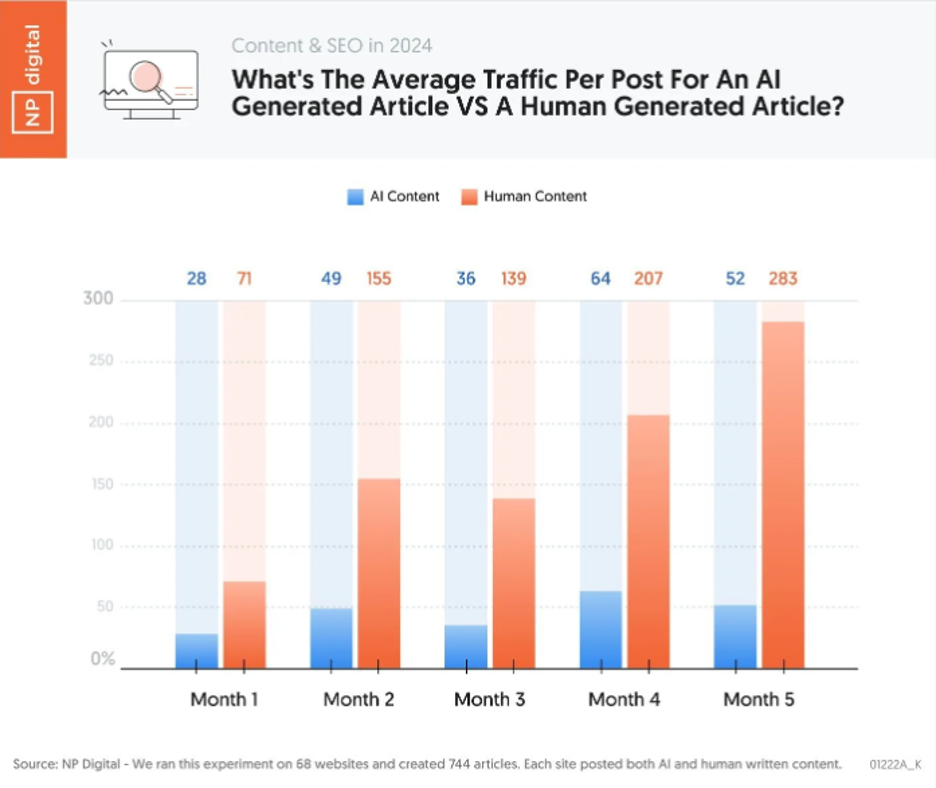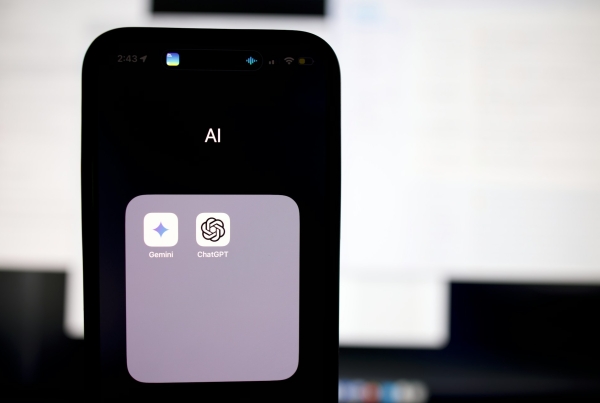AI is changing the way we work, but are business owners using it the right way? Whether it’s generating ideas, writing blog posts, or crafting social media captions, AI tools have become an invaluable asset for many content creators. However, there are a lot of considerations that should be made before you hit publish on your AI-written content. In this article, we’re going to go through the do’s and don’ts of using AI to write content to ensure your company is publishing the best quality content possible.
How to Use AI in Content Creation
AI can be a great tool for marketers, if done right. But, it’s essential to know how and when to use it. Here are some of the best ways to use AI to write content.
Brainstorming and Idea Generation
One of the most practical uses of AI is for generating fresh ideas. AI-powered tools like Jasper and ChatGPT can provide lists of topics based on your niche, suggest creative angles, and help you expand your content strategy. This can save you hours of research and overcoming the writer’s block that we have all experienced. For example, if you knew that you wanted to write a blog article that goes over marketing trends, but couldn’t think of an enticing enough title, you could prompt ChatGPT to help.
Content Structuring and Outlining
AI tools excel at organizing large amounts of information, making them perfect for creating outlines or structuring long-form content. If you need to break down a topic into key sections, AI can give you a solid framework to build on, providing the skeleton of an article that you can then fill in with your own information. AI tools can even suggest subheadings, transitions, and call-to-action statements that align with your goals. This added structure can be particularly helpful when dealing with dense topics, ensuring your content remains clear, engaging, and well-organized.
Writing Assistance
AI can help you write more efficiently by suggesting sentences or paragraphs that match your intended tone and style. While you should avoid letting AI completely take over, it can assist with repetitive or straightforward content such as FAQs or product descriptions. This allows you to focus on the more complex or creative aspects of content writing. Additionally, AI writing tools can save significant time by handling the more mechanical parts of content creation, such as expanding on short sentences, checking grammar, and maintaining consistency in tone across longer pieces.
How Not to Use AI for Content Writing
While AI can be a valuable asset, it’s not without limitations. Misusing AI in content creation can backfire, harming your brand’s credibility and your content’s performance. Here is how to not use AI to write content.
Don’t Skip the Editing and Fact Checking Process
While AI can speed up content creation, it’s not flawless. One of the biggest mistakes you can make is trusting AI-generated content without thoroughly editing and fact-checking it. AI models can produce grammatical errors, awkward phrasing, or even misinformation based on outdated or inaccurate data sources. Since AI pulls information from a vast array of content online, it may also unintentionally replicate biased or misleading viewpoints. Any sources, statistics, or opinions from AI has need to be fact-checked before you hit publish.
Avoid Complete Automation
While it may be tempting to let AI handle the entire writing process, this can result in content that feels robotic, repetitive, and lack personality. It can generate sentences that sound technically correct but miss the emotional or contextual cues needed to engage readers fully. This is why it’s crucial to use AI as a supplementary tool rather than a replacement. While it can handle repetitive tasks like generating meta descriptions or structuring content outlines, the core of your content should always be crafted or at least significantly revised by a human who understands the audience, the industry, and the brand voice.
Don’t Skip Your Personal Experiences
Personal experiences and insights are what make content relatable and engaging. One of the areas where AI struggles the most is in creating content with a human touch—something that reflects personal stories, lived experiences, or unique perspectives. AI can analyze data and generate facts, but it cannot replicate the kind of authenticity that comes from real-world experiences. These are what make your content unique, relevant, and trustworthy. Readers are much more likely to engage with content that speaks to them personally, whether through a shared challenge, an insightful anecdote, or a specific lesson learned. AI, no matter how advanced, simply can’t replicate the authenticity and relatability that come from lived human experiences.
AI Generated Content vs. Google
Google has made it clear that it prioritizes high-quality, original content that provides real value to readers. Here are some considerations that you should think about before publishing AI-generated content.
Google’s Algorithm Favors Expertise and Authority
Google’s ranking factors heavily weigh Expertise, Experience, Authority, and Trustworthiness. This is otherwise known as their EEAT Algorithm. AI-generated content often fails to demonstrate real expertise, especially in specialized industries. For your content to rank well, it needs to be authentic, credible, and written by someone with expertise in the subject matter. it’s crucial to avoid over-reliance on AI for the actual writing process, especially when it comes to crafting emotionally resonant or highly specialized content. Always use AI as an assistant rather than a replacement for human creativity.
AI-Generated Content Can be Penalized
While using AI for minor tasks like brainstorming or outlines is acceptable, publishing low-quality, AI-written articles can result in penalties. Google’s algorithm is getting better at detecting AI-generated content, especially when it’s generic or doesn’t meet quality standards. This could result in lower rankings or even being removed from search results altogether. In fact, according to a study by Neil Patel, leading SEO expert, found that 94.12% of the time human written content outranked AI-created content. And, human written content has a longer life as seen in the chart below.
 To Use or Not Use AI?
To Use or Not Use AI?
When used correctly, AI can be a great tool for marketers. However, it’s important to avoid over-reliance on AI for the actual writing process, especially when it comes to providing examples and emotion. Remember, Google values high-quality, authentic content that provides real value to users—something that AI-generated content often struggles to deliver. If you need any help creating content that resonates with your audience, don’t hesitate to reach out to our team.
About IN2communications
IN2communications is an award-winning digital marketing and web design agency helping hundreds of B2B organizations create awareness, boost consideration rates and generate sales leads.
Our awesome team provides experienced expertise in the following areas: Creative Strategy, B2B Campaigns, Web Development, Video Production, Social Media, Paid Advertising, SEO, Email Campaigns, Blogging, Presentations, Webinars and remarkable Content Creation.



